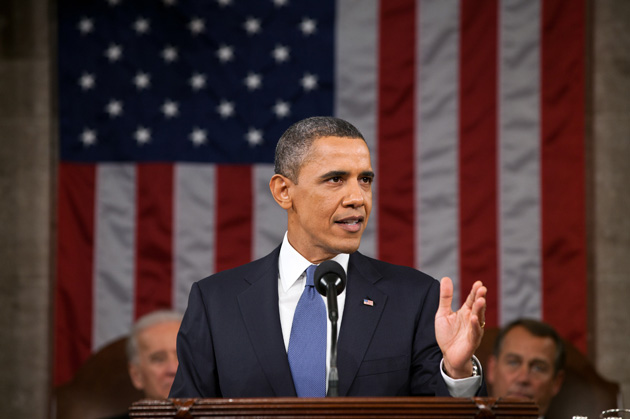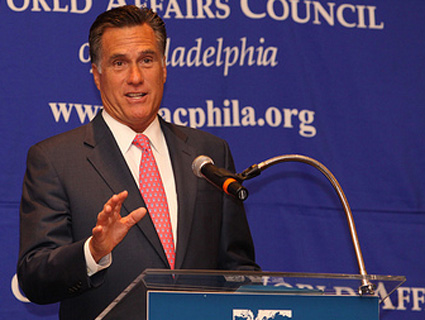 Pete Souza/The White House/ZumaJump to all the best tweets of the debate, as it unfolded in real-time, by the MoJo news team and other political junkies.
Pete Souza/The White House/ZumaJump to all the best tweets of the debate, as it unfolded in real-time, by the MoJo news team and other political junkies.
A year ago, President Barack Obama, in his second State of the Union address, spoke in lofty terms about how to “win the future.” Tonight, his third annual report to Congress was more about winning the next nine months. That’s how much time Obama has left to persuade voters that his vision for the coming years is better than that of the Republicans—and that he has a way to get there.
With this speech, Obama forcefully presented a view of the nation and the tasks at hand that positioned him as a can-do, patriotic, forward-looking optimist against obstructionist Republicans with a dark take on the nation’s prospects. He pitched government policies that would bolster middle-class security: job-training programs, tax credits for college tuition and repatriating jobs to the United States, mortgage refinancing, research-and-development spending, and measures to boost domestic manufacturing. “Take the money we’re no longer spending at war,” he declared, “use half of it to pay down our debt, and use the rest to do some nation-building right here at home.”
Obama took up the call of the Occupy Wall Street movement, decrying unfair tax breaks for millionaires. He adopted a modified version of the OWS 1-vs.-99-percent message: “If you’re earning a million dollars a year, you shouldn’t get special tax subsidies or deductions. On the other hand, if you make under $250,000 a year, like 98 percent of American families, your taxes shouldn’t go up. You’re the ones struggling with rising costs and stagnant wages. You’re the ones who need relief.”
And he countered the typical GOP retort: “You can call this class warfare all you want. But asking a billionaire to pay at least as much as his secretary in taxes? Most Americans would call that common sense. ” (The camera turned to Warren Buffett’s secretary, who was sitting next to First Lady Michelle Obama.)
The president denounced Wall Street pirates and announced a new Financial Crimes Unit. His language could have come off a cardboard sign in Zuccotti Park: “We can either settle for a country where a shrinking number of people do really well, while a growing number of Americans barely get by, or we can restore an economy where everyone gets a fair shot, and everyone does their fair share, and everyone plays by the same set of rules.”
He offered a calm and rage-free type of populism: “Do we want to keep these tax cuts for the wealthiest Americans? Or do we want to keep our investments in everything else—like education and medical research, a strong military, and care for our veterans? Because if we’re serious about paying down our debt, we can’t do both.”
The president was assertive in challenging the Republicans, without being combative. He didn’t yield an inch on his core initiatives—defending health care reform and doubling-down on supporting clean energy programs. This speech reflected his strategists’ belief that he can juice up both his progressive base and independent voters by fighting for centrist programs (or what used to be centrist programs) with a progressive bent.
In the past year, Obama has moved from a compromiser-in-chief looking to cut deals with the Republicans (to avoid such negative consequences as the end of the Bush tax cuts for middle-income earners, a government shutdown, and a default of on US government debt) to a semipopulist battler for the middle class who is eager to defy Republicans over issues of economic fairness and the role of government. Once the president was free of the debt ceiling tar pit—and the Republicans were no longer holding the economy hostage—he launched a campaign for a jobs bill that emphasized confrontation, not negotiation. He and his aides had concluded that few, if any, worthwhile deals could be reached with House Speaker John Boehner, who was essentially held captive by the tea party wing of his party.
Consequently, Obama could leave behind the failed attempt to reach a grand bargain on deficit reduction and initiate a grand debate over national values.
Due to this shift, the 2012 race is shaping up as a titanic face-off between a president who advocates using government to bolster the economy and address inequities and Republicans who have one answer to everything: Smother government and let the markets run free. In his speech, Obama called for “great projects.” Republicans call for no projects—that is, nothing outside the private sector. This is a damn clear contrast.
Compared to GOP Indiana Gov. Mitch Daniels’ less-than-inspiring rebuttal, Obama was full of vigor and vision. Daniels hit all the Republican talking points: class warfare, freedom, markets, and lightbulbs. (You had to be there.) But it was a flat same-old, same-old response that seemed cast for committed Republican, not independent voters. His was a dour message—freedom is under assault. Obama aims to rouse.
This State of the Union—Obama’s best so far—won’t move the needle (as politicos like to say) in Washington. The president’s calls for bipartisan cooperation, for reforming the easy-to-abuse rules of the Senate, for campaign finance reform, and for lowering the heated rhetoric will not be heeded. But he demonstrated that when it comes to concocting a political messaging—and tethering it to his past achievements and current proposals—he can be masterful. (This raises the question: Why hasn’t he done this consistently from the get-go?)
The big ending of the speech turned to the Osama bin Laden mission. Obama did not cite this success as a reply to GOP charges that he’s an appeasing wuss. Instead, he used it like a national-security version of an Amish barn-raising—defining the American story as one of communal action: We’re not individual actors being bounced around by market forces; we band together for the greater good. It’s worth a read:
One of my proudest possessions is the flag that the SEAL Team took with them on the mission to get bin Laden. On it are each of their names. Some may be Democrats. Some may be Republicans. But that doesn’t matter. Just like it didn’t matter that day in the Situation Room, when I sat next to Bob Gates, a man who was George Bush’s defense secretary, and Hillary Clinton, a woman who ran against me for president.
All that mattered that day was the mission. No one thought about politics. No one thought about themselves. One of the young men involved in the raid later told me that he didn’t deserve credit for the mission. It only succeeded, he said, because every single member of that unit did their job—the pilot who landed the helicopter that spun out of control; the translator who kept others from entering the compound; the troops who separated the women and children from the fight; the SEALs who charged up the stairs. More than that, the mission only succeeded because every member of that unit trusted each other—because you can’t charge up those stairs, into darkness and danger, unless you know that there’s someone behind you, watching your back.
And that is why the nation must decide to use its collective wealth (via taxation) to work together (via prudent and fiscally responsible government programs that invest in the future and protect the citizenry) for the betterment of the entire nation.
Obama is pitching a patriotic, quasi-populist progressivism (while conceding the need for deficit reduction and government cost efficiencies). Before he can win the future, he’s going to have to sell this message. And this speech was an effective kickoff for that campaign.
And that’s the speech. One hour and five minutes long. Assertive but not angry.
Progressives can get too bogged down in critique. Obama showed how to criticize while reaching higher. #SOTU
— David Corn (@DavidCornDC) January 25, 2012
Down the stretch we come:
“This nation is great because we get each other’s back” #AmericaFuckYeah! #IfOnly
— Clara Jeffery (@ClaraJeffery) January 25, 2012
OH BY THE WAY I KILLED OSAMA BIN LADEN.
— Andrew Exum (@abumuqawama) January 25, 2012
IF GWBush said this, conservatives would love it. #SOTU
— David Corn (@DavidCornDC) January 25, 2012
Bringing it home with bin Laden. Of course. #SOTU #TeamRomneyWeeps
— Mark Follman (@markfollman) January 25, 2012
“Send me a bill” is the presidential equivalent of “one more time and you get a time out.” And just as effective.
— Clara Jeffery (@ClaraJeffery) January 25, 2012
Kinda surprised Obama didn’t name-check Romney with thanks for the health care idea.
— Jim Tankersley (@jimtankersley) January 25, 2012
On taxes and income inequality:
We’ve reached the Elizabeth Warren portion of the speech.
— Tim Murphy (@timothypmurphy) January 25, 2012
Mega-rich sometimes pay lower taxes than workers. True. Our check on Buffett. ow.ly/8FgTD #SOTU
— PolitiFact (@politifact) January 25, 2012
Obama: “You can call it class warfare all you want.” GOP: Challenge accepted.
— NickBaumann (@NickBaumann) January 25, 2012
10 richest members of Congress voted 100 percent to extend the Bush tax cuts: bit.ly/ek3p3e
— Tim Murphy (@timothypmurphy) January 25, 2012
Sorry, but taxes are going to have to go up on those making under $250K. It’s just math.
— Kevin Drum (@kdrum) January 25, 2012
Obama is close to #OWS but his divide is 98 percenters vs 2 percenters. #SOTU
— David Corn (@DavidCornDC) January 25, 2012
Why Mitt Romney should pay higher taxes by @kdrum mojo.ly/zcmnI3
— Clara Jeffery (@ClaraJeffery) January 25, 2012
Wish I could have a TV face shot of Mitt Romney not applauding right now. #SOTU #taxes
— Josh Harkinson (@JoshHarkinson) January 25, 2012
Highlights so far:
Gabrielle Giffords received a standing ovation from those in attendance at #SOTU. Video: ow.ly/8FgAU
— NewsHour (@NewsHour) January 25, 2012
Exactly my thought. RT @dan_munz: This means it will poll incredibly well. RT @kdrum: This is a remarkably content-free speech.
— Kevin Drum (@kdrum) January 25, 2012
When Obama talks about a fee on the largest financial institutions, Geithner winces deeply, looks constipated.
— Heidi N. Moore (@moorehn) January 25, 2012
Obama seems to be intentionally emphasizing his own powerlessness. #thatsunique #sotu
— Andrew Golis (@agolis) January 25, 2012
Our reporter Kate Sheppard weighs in on the energy section of the speech:
And the Clean Energy Standard is recycled from last year. At least Obama likes recycling. #SOTU
— Kate Sheppard (@kate_sheppard) January 25, 2012
Obama goes full “Drill baby drill.” #SOTU
— Kate Sheppard (@kate_sheppard) January 25, 2012
Climate line: “The differences in this chamber may be too deep right now to pass a comprehensive plan to fight climate change.” #SOTU
— Kate Sheppard (@kate_sheppard) January 25, 2012
And there it is. Senate GOP blasts email: “Despite Rhetoric About ‘All Of The Above Strategy’, Obama Rejected The Keystone XL Pipeline”
— Chris Moody (@Chris_Moody) January 25, 2012
note that he didn’t say he’d seek to prevent spills — only that oil companies “can contain the kind of oil spill we saw in the Gulf” #sotu
— Kate Sheppard (@kate_sheppard) January 25, 2012
GOP reactions thus far:
Sort of amusing watching Boehner’s painfully reluctant applause.
— Kevin Drum (@kdrum) January 25, 2012
Eric Cantor is negative-clapping right now. He actually is creating silence. #SOTU
— Jamil Smith (@JamilSmith) January 25, 2012
Cantor actually claps for “pass the payroll tax cut without delay.” #wishfulthinking #SOTU
— daveweigel (@daveweigel) January 25, 2012
Bipartisanship: Jeff flake is helping giffords stand for potus applause lines – even when most repubs aren’t clapping. #sotu
— Dana Bash (@DanaBashCNN) January 25, 2012
The president takes on companies that send jobs overseas:
Pay attention to that basic minimum tax proposal for multinationals. That’s a big deal.
— Ezra Klein (@ezraklein) January 25, 2012
I wonder if Obama read the NYT’s piece on the iphone. He sounds a bit overly optimistic about American manufacturing.
— Josh Harkinson (@JoshHarkinson) January 25, 2012
If Obama supports US manufacturing, why did he invite Steve Jobs’ wife to #SOTU? Apple has outsourced: ow.ly/8FfN6
— Corbin Hiar (@CorbinHiar) January 25, 2012
Shorter Obama: “I can’t win without Michigan.” #SOTU
— Jared Keller (@jaredbkeller) January 25, 2012
Biden watch:
Sorry, once you start watching Joe Biden at one of these things, it’s really hard to stop.
— Tim Murphy (@timothypmurphy) January 25, 2012
Biden just had an Altoid.
— Jacob Weisberg (@jacobwe) January 25, 2012
How many cups of coffee did Biden have to drink? (Imagine if Rick Perry was vice president and had to stay up so late.) #SOTU
— David Corn (@DavidCornDC) January 25, 2012
And we’re off:
Obama leads with Iraq – and brings it back to OBL. Smooth. #SOTU
— rachelsklar (@rachelsklar) January 25, 2012
The #SOTU in short: I ended a war. I killed bin Laden. No wimp here.
— David Corn (@DavidCornDC) January 25, 2012
Obama Begins State Of The Union By Asking Congress To Imagine Newt Gingrich Standing Before Them onion.com/wuwaBW
— The Onion (@TheOnion) January 25, 2012
SYMBOLOGY: Biden and Obama, Democrats, have flag pins on lapels. Boehner does not. President once had to defend not wearing one… #mapoli
— Glen Johnson (@globeglen) January 25, 2012
This is the big set-up for 2012: whose values do you like better–ours or theirs. #SOTU
— David Corn (@DavidCornDC) January 25, 2012
Pre-game warmups:
The Gabby Gifford moment was heartwarming. A true emotional engagement in the middle of political theater. #SOTU
— David Corn (@DavidCornDC) January 25, 2012
You guys really need some new jokes…. RT @richlowry: president obama’s teleprompters look resplendent tonight #sotu
— Kevin Drum (@kdrum) January 25, 2012
Here’s your Julian Castro profile, btw, if you’re curious about the 15-year-old in the suit in the FLOTUS box: nyti.ms/Azeg5k
— Tim Murphy (@timothypmurphy) January 25, 2012
I”m going to tweet this piece, by @mattglassman312, again: j.mp/xpsVJB The State of the Union is great, ignore the haters.
— Jamelle Bouie (@jbouie) January 25, 2012
It’s the Inequality Stupid, or 13 SOTU talking points charts: mojo.ly/hiAPmg
— Clara Jeffery (@ClaraJeffery) January 25, 2012
Inviting Warren Buffet’s secretary–who famously pays higher tax rate than boss–to SOTU = genius.
— Clara Jeffery (@ClaraJeffery) January 25, 2012
BREAKING: Tom Vilsack is Secretary of Agriculture.
— Tim Murphy (@timothypmurphy) January 25, 2012
RT @washingtonpost: #BREAKINGNEWS: Ag Secretary Tom Vilsack to serve as Cabinet’s “designated survivor” for tonight’s #SOTU via @EdatPost
— Gavin Aronsen (@garonsen) January 25, 2012
Interested to see if Obama will own recent #Iran sanctions legislation. Remember, WH was not happy when it was proposed.
— Hamed Aleaziz (@Haleaziz) January 25, 2012
“Or we can restore an economy where everyone gets a fair shot, e/one does their fair share, & everyone plays by the same set of rules” #SOTU
— David Corn (@DavidCornDC) January 24, 2012
“We can either settle for a country where a shrinking number of people do really well, while a growing # of Americans barely get by” #SOTU
— David Corn (@DavidCornDC) January 24, 2012
“I intend to fight obstruction w/ action, and I will oppose…very same policies that brought on this econ. crisis in the first place” #SOTU
— David Corn (@DavidCornDC) January 24, 2012
WH releases #SOTU excerpts with fighting spirit: “No bailouts, no handouts, and no copouts.”
— David Corn (@DavidCornDC) January 24, 2012














